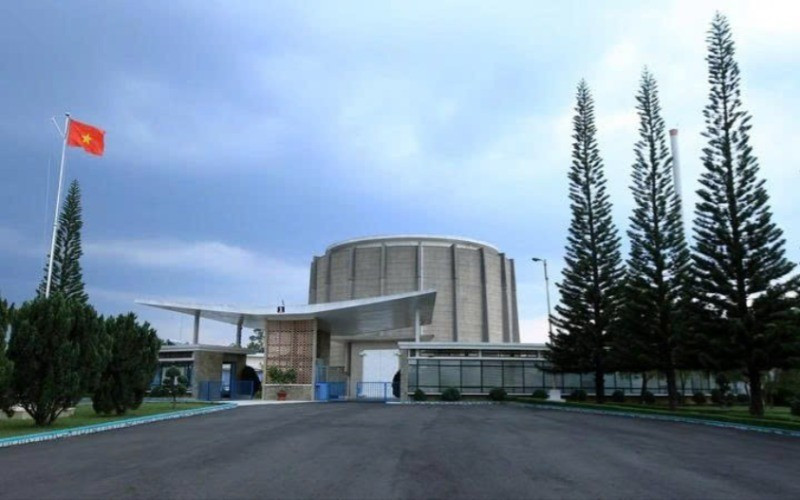Realising orientation of safe, effective and sustainable nuclear power development
In the context of Viet Nam promoting the development of science and technology and transition to clean energy, the amended Law on Atomic Energy is not only an urgent requirement but also a “guiding compass” for the safe and effective use of atomic energy, the realisation of nuclear power development orientation, and peaceful purposes.

Institutionalising Party's guideline on atomic energy development
On June 27, at its 9th session, the 15th National Assembly passed the amended Law on Atomic Energy. Over the past 15 years, the law has become a solid legal foundation, creating conditions for domestic, foreign organisations, and international agencies to carry out activities in the field of atomic energy in Viet Nam.
The law has importantly contributed to promoting the peaceful application of atomic energy and raising awareness among all sectors, levels and people of its benefits for national socio-economic development.
However, new circumstances require timely updates and completion to be suitable with scientific and technological development, ensure security, and meet international commitments on peaceful development and application of atomic energy, which is being evaluated as a critical solution.
The amended Law on Atomic Energy aims to continue institutionalising the Party's guidelines and the state’s policies on atomic energy, ensuring consistency with related documents and meeting practical demands. It provides a comprehensive and adequate legal framework for atomic energy; strengthens state management of radiation safety, nuclear safety and security; sustainably develops atomic energy applications; fulfils Viet Nam’s international commitments and obligations; promotes international cooperation. In doing so, atomic energy is expected to become a new driver of Viet Nam’s fast and sustainable development in the new era. The amended law is built to clearly express the state’s “development creation” role in the field requiring high safety and complex technology.
During the drafting process of the law, the drafting agency has focused on reviewing and removing overlapping regulations, while supplementing missing contents to address practical requirements. It has actively sought consulting ideas from relevant ministries and sectors to ensure synchronisation, feasibility and compliance with international commitments. The revised law clearly delineates its scope, defines responsibilities of relevant bodies, integrates and connects administrative procedures, and assigns a single focal point for management.
Towards safe, efficient and sustainable development of nuclear power
The focus of the policy is to orient the development of atomic energy for peaceful purposes, socio-economic development, environmental protection, contributing to ensuring energy security and sustainable development of the country. The policy covers from investment, resource mobilisation, infrastructure improvement, enhancement of nuclear safety and security capabilities to research and technological development, and human resource training, international cooperation, and raising public awareness.
One of the notable provisions of the revised Law on Atomic Energy is that the state ensures the budget for building and operating the national environmental radiation monitoring and warning network; investing in building national-level facilities for the storage, treatment and disposal of radioactive waste, used radiation sources and used nuclear fuel. This is a crucial step that reflects a long-term vision for ensuring radiation safety, nuclear safety and security—fundamental factors for all applications in this field.
At the same time, the law expands the ability for capital mobilisation, encouraging private sector and international partners to invest in and develop atomic energy. This is not only suitable with Resolution No. 68-NQ/TW on private economy development but also reflects the participation of organisations and individuals in the wide application of nuclear energy in socio-economic sectors such as healthcare, industry, agriculture, natural resources and the environment.
A key issue raised is the demand for highly qualified human resources, especially for future nuclear power projects. The inclusion in the law of incentive mechanisms for training, recruitment, and preferential treatment of experts and scientists is considered essential for sustainable development. Simultaneously, comprehensive investment in modern infrastructure and laboratories is needed to create a solid foundation for research, training, and mastery of technologies.
The revision of the Law on Atomic Energy is not merely a legislative technical adjustment but a major institutional turning point.
Notably, the policy on promoting technology transfer, enhancing manufacturing capacity, and localising equipment shows strategic vision. Moreover, the policy of securing budget allocations for scientific and technological research, prioritising investment in research, technology transfer, scientific infrastructure development, and human resource training in the field of atomic energy—represents a direct institutionalisation of the Politburo’s Resolution No. 57-NQ/TW on the development of science, technology and innovation.
Furthermore, the policy to synchronously develop cultural, educational, healthcare, and social welfare infrastructure in localities with nuclear facilities aims to foster social consensus, strengthen public trust, and ensure the sustainable development of the atomic energy sector.
The law also legalises many international treaties to which Viet Nam is a signatory, in accordance with the guidelines of the International Atomic Energy Agency (IAEA). Strengthened international cooperation and deepened integration will allow Viet Nam to more quickly access new technologies and modern management experiences while enhancing the capacity of its officials and experts.
An important highlight is that the communication policy on atomic energy is included in the law, becoming a component of the safety ecosystem. The construction of a safety culture and nuclear security culture is an essential condition for the development of the specialised, high-risk sector, which requires strong public consensus.
It can be affirmed that the revision of the Law on Atomic Energy not only simply perfects legislative techniques, but it is also a significant institutional turning point. It concretises the Party’s major guidelines, demonstrates the state’s leadership role, unlocks resources, and lays a solid foundation for the substantive and sustainable development of the atomic energy sector. In the long term, this is the foundation for Viet Nam to master nuclear technology, ensure energy security, develop high-tech industry and affirm the country's position in the process of international integration.








